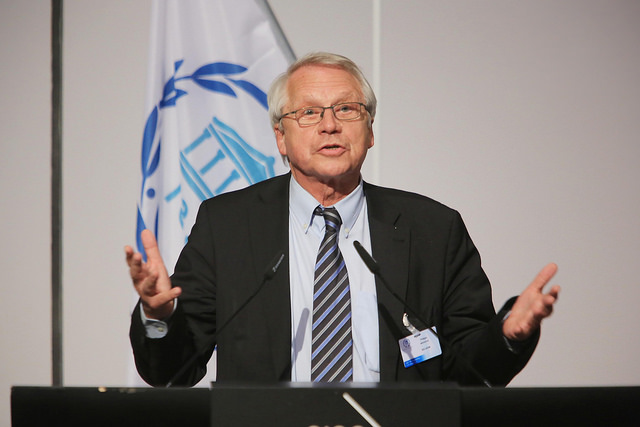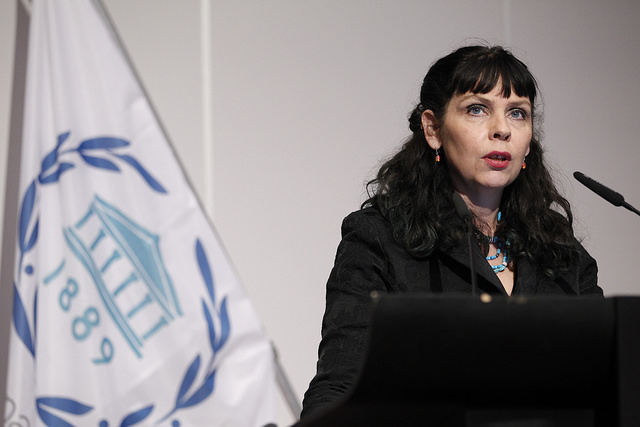World's parliaments meet for 133rd Assembly. PNND accepted as a Permanent Observer
Migration and digital freedom major issues. Nuclear Zero court case discussed.
World's parliaments meet for 133rd Assembly. PNND accepted as a Permanent Observer
Migration and digital freedom major issues. Nuclear Zero court case discussed.
On October 18, the Inter Parliamentary Union – the world’s organization of parliaments – accepted PNND as a Permanent Observer with rights to participate in IPU assemblies.

The IPU, which comprises 166 national parliaments and 10 regional parliaments, holds two assemblies each year with the participation of approximately 700 parliamentarians.
PNND was accepted as a Permanent Observer following a number of years of cooperation with IPU on nuclear disarmament, including;
PNND members proposing resolutions on nuclear disarmament which were adopted by the IPU Assembly in 2009 and 2014 (see World body of parliaments calls for negotiations to abolish nuclear weapons);
Interactive sessions on nuclear disarmament at a number of IPU assemblies – in particular over the year leading up to the 2014 resolution;
Publication of a joint IPU/PNND Handbook for Parliamentarians on Nuclear Non-proliferation and Disarmament (available in English, French, Spanish, Russian and Bulgarian);
Joint PNND/IPU events at the NPT Review Conferences (and Prep Meetings) and UN General Assembly;
Participation of IPU in PNND actions and events commemorating the International Day for the Total Elimination of Nuclear Weapons (see The Inter-Parliamentary Union supports a nuclear weapons free world).

The IPU Assembly also adopted action resolutions on digital freedom and fairer migration.
The resolution on digital freedom, proposed by PNND Council member Birgitta Jonsdottir (Iceland), urges parliaments to review national laws to prohibit the interception, collection, analysis and storage of personal data without informed consent of concerned individuals or valid court order.
It underscores the need for privacy protection to be consistent across domestic and international borders, and calls on parliaments to ensure national law cannot be bypassed by data-sharing agreements with foreign States or multinationals.
Parliaments are urged to make sure that attempts to curb democratic voices online, including those of journalists and human rights defenders through imprisonment, censorship, hacking or other repressive means are strictly forbidden in national legislation. Coherent and comprehensive laws to protect whistleblowers in line with international standards are also strongly recommended.

The IPU Assembly resolution on migration focused on identifying parliamentary action for a fairer, smarter and more humane migration against a backdrop of a global refugee crisis, outlined a set of measures that MPs could take to protect migrants and maximize the full potential of the world’s oldest human phenomenon.
“Migration is ultimately an opportunity to positively transform lives, society and economies. We have seen that throughout history. But it has never been easy or without price for the migrant, or the countries of origin and destination,” said IPU President Saber Chowdhury, who also serves as PNND Co-President. “This is the most complex challenge of our time. We as parliamentarians must get it right. The potential for positive change that success would bring is incalculable.”
The IPU Assembly included a very interesting session on the International Court of Justice, highlighting successful examples of ICJ cases resolving disputes, and preventing or ending wars. These included cases where smaller, less powerful countries were victorious over more powerful aggressive countries (such as Nicaragua v the USA and New Zealand v France).

PNND Global Coordinator Alyn Ware spoke about the current case in the Court lodged by the Marshall Islands against the nuclear armed States on their failure to implement their nuclear disarmament obligation. Alyn indicated that parliamentarians could encourage their governments to support the case by intervening – indeed the ICJ has contacted all States Parties to the NPT noting the possibility of their interest in the case and their right to intervene.
The World Future Council, IPU and UNICEF used the occasion of the 133rd IPU Assembly to give present the 2015 Future Policy Awards which focused on best policies for children’s rights. The winning policy was the Zanzibar Children’s Act for its effective response to child abuse and violence and for its promotion and protection of child rights that have led to a marked societal change in attitudes towards children in Zanzibar.
Silver (runner-up) awards were made to Maryland’s Environmental Literacy Standards policy and Finland’s Basic Education Act, with an honorary award to Sweden's Children and Parent Code to prohibit all corporal punishment and other humiliating treatment of children.

More than 650 MPs, including 92 Speakers and Deputy Speakers of Parliament and 213 women, attended the 133rd IPU Assembly. It was the highest ever percentage (32.7 per cent) of women MPs participating at an IPU Assembly.
Weight Loss Transformations - Lose Weight Running Stories